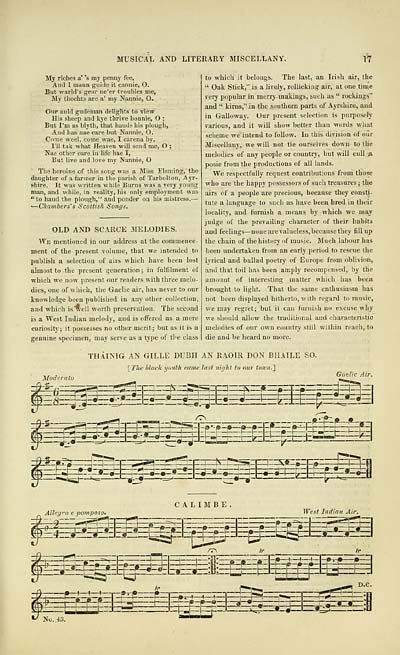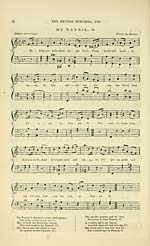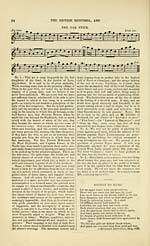Glen Collection of printed music > Printed music > British minstrel, and musical and literary miscellany
(355) Page 17 - Thainig an gille dubh an raoir don bhaile so
Download files
Complete book:
Individual page:
Thumbnail gallery: Grid view | List view

MUSICAL AND LITERARY MISCELLANY.
fr
My riches a' 's my penny fee,
And 1 maun guide it cannie, O.
But warld's gear ne'er troubles me,
My tiiochts are a' my Nannie, O.
Our auld gudeinan delights to view
His sheep and kye thrive bonnie, O ;
But I'm as blyth, that bauds his plough.
And has nae care but Nannie, O.
Come weel, come wae, I carena by,
I'll tak what Heaven will send me, O ;
Nae other care in life hae I,
But live and love my Nannie, O
The heroine of this song was a Miss Fleming,' the
daughter of a farmer in the parish of Taj'bolton, Ayr-
shire. It was written while Burns was a very young
man, and while, in reality, his only employment was
"to baud the plough," and ponder on his mistress. —
■ — Chambers' s Scottish Songs.
OLD AND SCARCE MELODIES.
We mentioned in our address at the commence-
ment of the present volume, that we intended to
publish a selection of airs which have been lost
almost to the present generation ; in fulfilment of
which we now present our readers with three melo-
dies, one of which, the Gaelic air, has never to our
knowledge been published in any other collection,
and which is well worth preservation. The second
is a West Indian melody, and is offered as a mere
curiosity; it possesses no other merit; but as it is a
genuine specimen, may serve as a type of the class
to which it belongs. The last, an Irish air, the
" Oak Stick," is a lively, rollicking air, at one time
very popular in merry-makings, such as " rockings"
and " kirns," in the southern parts of Ayrshire, aiid
in Galloway. Our present selection is purposely
various, and it will show better than words what
scheme we intend to follow. In this division of our
Miscellany, we will not tie ourselves down to the
melodies of any people or country, but will cull a
posie from the productions of all lands.
We respectfully request contributions from those
who are the happy possessors of such treasures ; the
airs of a people are precious, because they consti-
tute a language to such as have been, bred in their
locality, and furnish a means by which we may
judge of the prevailing character of their habits
and feelings— none are valueless, because they fill up
the chain of the history of music. Much labour has
been undertaken from an early period to rescue the
lyrical and ballad poetry of Europe from oblivion,
and that toil has been amply recompensed, by the
amount of interesting matter which has been
brought to light. That the same enthusiasm has
not been displayed hitherto, with regard to music,
we may regret; but it can furnish no excuse why
we should allow the traditional and characteristic
melodies of our own country still within reach, to
die and be heard no more.
THAINIG AN GILLE DUBH AN RAOIR DON BHAILE SO-
[Z/te black youth came last nlijht to oar town.]
Moderato
q=:=s==?E:
:i=i:
:?=::=?:
Gaelic Air.
:S=i:
2 — ^ji — -=^ — -1-=^
-J-
/o
■^^-
. ^^•Z?Z^-.ft
-]/'■
^-^-
§^§^3:
:?;*riz^t^=^=i-i=^=^= =i=i:
!r-a:
q=zjfc]!!:=^=|=q=q^:
._^_^.
:ed=fc^:3;
-^^^^^
C ALIMBE.
Allegro e pomposo.
West Indian Air.
E^lEEiE^EE^EES
£ES^
:tzfz
"HTltinf ' "
■^^m^m
wrzzizzZ!^
No. 43,
fr
My riches a' 's my penny fee,
And 1 maun guide it cannie, O.
But warld's gear ne'er troubles me,
My tiiochts are a' my Nannie, O.
Our auld gudeinan delights to view
His sheep and kye thrive bonnie, O ;
But I'm as blyth, that bauds his plough.
And has nae care but Nannie, O.
Come weel, come wae, I carena by,
I'll tak what Heaven will send me, O ;
Nae other care in life hae I,
But live and love my Nannie, O
The heroine of this song was a Miss Fleming,' the
daughter of a farmer in the parish of Taj'bolton, Ayr-
shire. It was written while Burns was a very young
man, and while, in reality, his only employment was
"to baud the plough," and ponder on his mistress. —
■ — Chambers' s Scottish Songs.
OLD AND SCARCE MELODIES.
We mentioned in our address at the commence-
ment of the present volume, that we intended to
publish a selection of airs which have been lost
almost to the present generation ; in fulfilment of
which we now present our readers with three melo-
dies, one of which, the Gaelic air, has never to our
knowledge been published in any other collection,
and which is well worth preservation. The second
is a West Indian melody, and is offered as a mere
curiosity; it possesses no other merit; but as it is a
genuine specimen, may serve as a type of the class
to which it belongs. The last, an Irish air, the
" Oak Stick," is a lively, rollicking air, at one time
very popular in merry-makings, such as " rockings"
and " kirns," in the southern parts of Ayrshire, aiid
in Galloway. Our present selection is purposely
various, and it will show better than words what
scheme we intend to follow. In this division of our
Miscellany, we will not tie ourselves down to the
melodies of any people or country, but will cull a
posie from the productions of all lands.
We respectfully request contributions from those
who are the happy possessors of such treasures ; the
airs of a people are precious, because they consti-
tute a language to such as have been, bred in their
locality, and furnish a means by which we may
judge of the prevailing character of their habits
and feelings— none are valueless, because they fill up
the chain of the history of music. Much labour has
been undertaken from an early period to rescue the
lyrical and ballad poetry of Europe from oblivion,
and that toil has been amply recompensed, by the
amount of interesting matter which has been
brought to light. That the same enthusiasm has
not been displayed hitherto, with regard to music,
we may regret; but it can furnish no excuse why
we should allow the traditional and characteristic
melodies of our own country still within reach, to
die and be heard no more.
THAINIG AN GILLE DUBH AN RAOIR DON BHAILE SO-
[Z/te black youth came last nlijht to oar town.]
Moderato
q=:=s==?E:
:i=i:
:?=::=?:
Gaelic Air.
:S=i:
2 — ^ji — -=^ — -1-=^
-J-
/o
■^^-
. ^^•Z?Z^-.ft
-]/'■
^-^-
§^§^3:
:?;*riz^t^=^=i-i=^=^= =i=i:
!r-a:
q=zjfc]!!:=^=|=q=q^:
._^_^.
:ed=fc^:3;
-^^^^^
C ALIMBE.
Allegro e pomposo.
West Indian Air.
E^lEEiE^EE^EES
£ES^
:tzfz
"HTltinf ' "
■^^m^m
wrzzizzZ!^
No. 43,
Set display mode to: Large image | Transcription
Images and transcriptions on this page, including medium image downloads, may be used under the Creative Commons Attribution 4.0 International Licence unless otherwise stated. ![]()
| Special collections of printed music > Glen Collection of printed music > Printed music > British minstrel, and musical and literary miscellany > (355) Page 17 - Thainig an gille dubh an raoir don bhaile so |
|---|
| Permanent URL | https://digital.nls.uk/91439205 |
|---|---|
| Description | Translation: The black youth came last night to our town. Also: Calimbe |
| Description | Scottish songs and music of the 18th and early 19th centuries, including music for the Highland bagpipe. These are selected items from the collection of John Glen (1833 to 1904). Also includes a few manuscripts, some treatises, and other books on the subject. |
|---|
| Description | The Glen Collection and the Inglis Collection represent mainly 18th and 19th century Scottish music, including Scottish songs. The collections of Berlioz and Verdi collected by bibliographer Cecil Hopkinson contain contemporary and later editions of the works of the two composers Berlioz and Verdi. |
|---|

